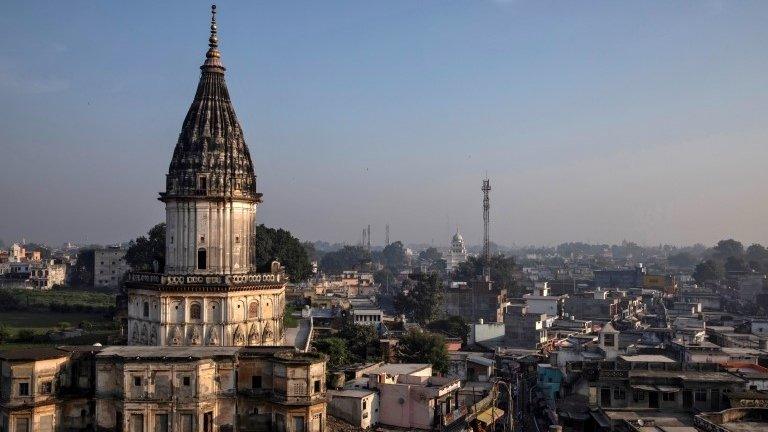Ayodhya: Temple to open at India’s religious fault-line
- Published
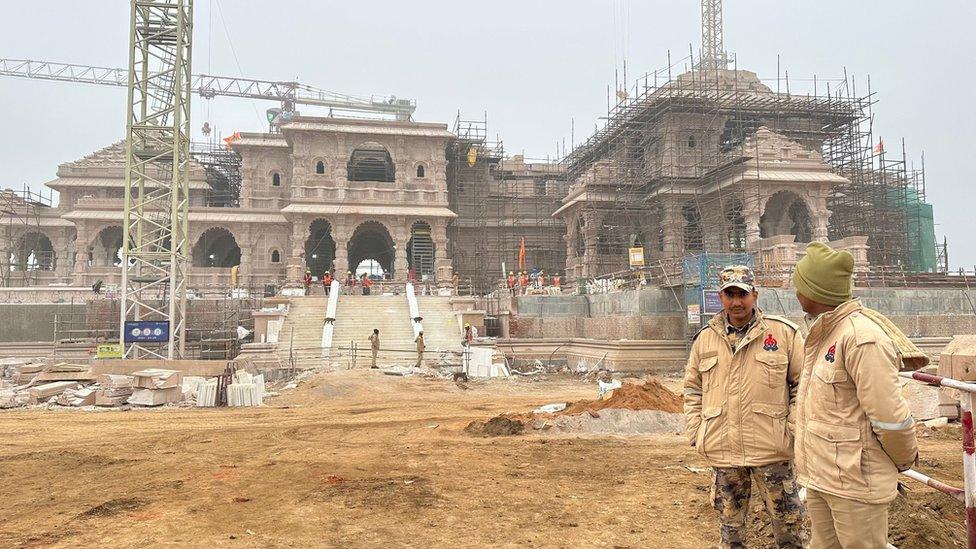
More than 30 years after a 400-year-old mosque was pulled down, a new temple has been built
Santosh Dubey says he has no regrets he helped tear down the mosque.
"It was religious work and I was put on this Earth to complete the task," he says. "There is no crime or sin in it."
Mr Dubey, a "kar sevak" (religious worker), was one of tens of thousands of Hindu men who demolished the 16th Century Babri Masjid in the Indian holy city of Ayodhya on 6 December 1992.
It was one of independent India's darkest days. The disputed site sits on one of its biggest religious fault-lines - thousands were killed in the violence that broke out.
More than 30 years later, where the mosque once stood a grand temple to Lord Ram, one of Hinduism's most revered deities, is about to be opened by India's Prime Minister Narendra Modi. That's controversial in a country with a secular constitution, but especially so because of the divisive history of the site.
Monday's ceremony is being seen as the informal start of his campaign for re-election this year, wooing India's Hindu majority. Across the country, millions of Hindus are gearing up to celebrate the day like a big festival, while employees of Mr Modi's federal government have been given a half day.
Sitting in his crumbling home, in a narrow alley in the city, paint and plaster peeling off its walls, Mr Dubey says he's proud of what he achieved.
"If we had not done what we did then the temple could never have been built," he says. "Religious sentiments are greater than the constitution. I am extremely happy now. I had taken a pledge that I would not repair my home until Lord Ram got his."
But for Muslims, who make up India's biggest minority, the day will evoke fear and painful memories. Some will send their children out of the city, fearing tensions might be stoked when the streets fill with Hindu devotees from around the country.
"We have been betrayed once, so we feel fear," says Mohammad Shahid. "Many outsiders will come into Ayodhya and it's when outsiders come that there's trouble."

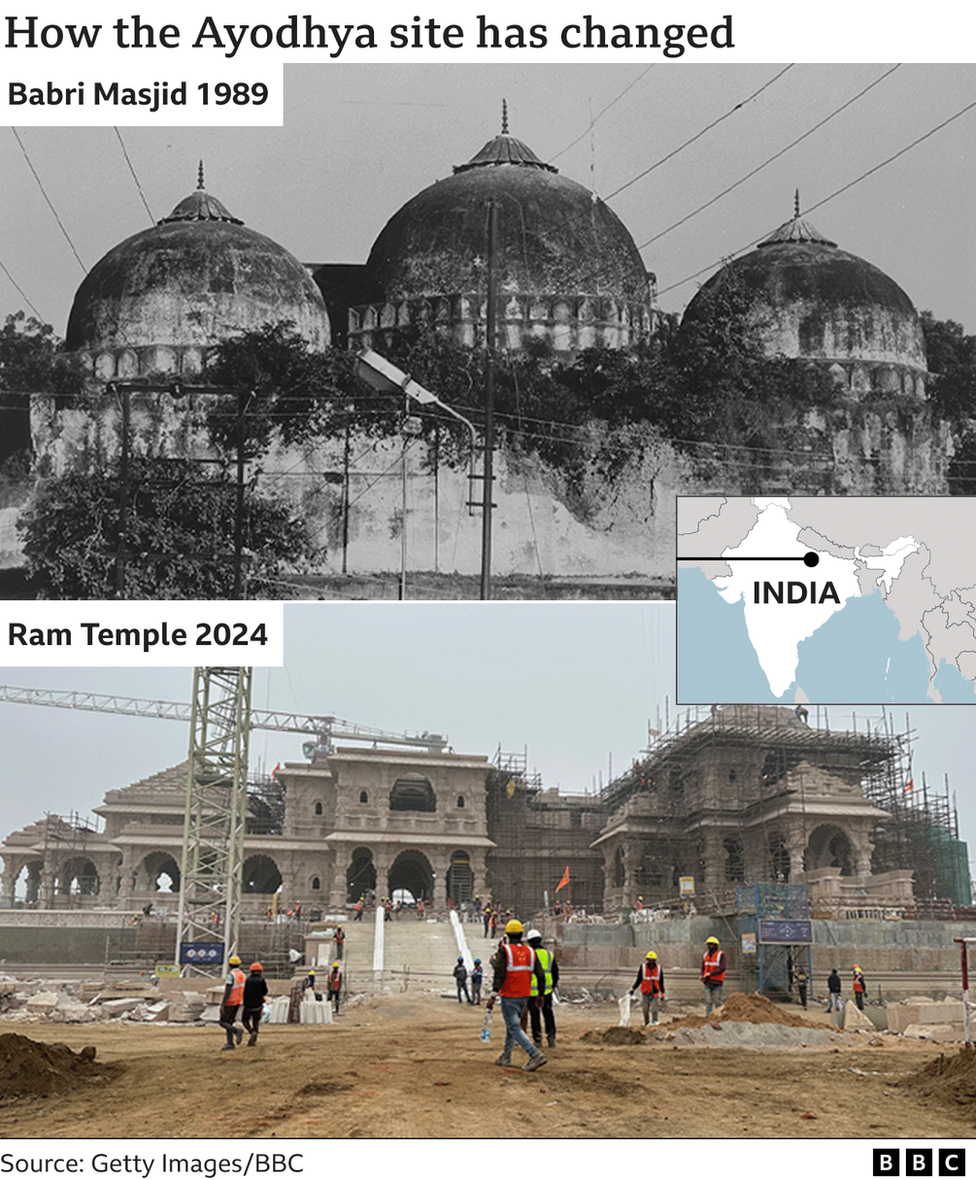
6 December 1992 was a defining moment in India's history. It was also a pivotal event in the political rise of the Hindu right-wing that's now seeking a third consecutive term in power.
Many Hindus believe Muslim emperor Babur destroyed a temple that stood at the birthplace of Lord Ram and built a mosque over it more than 500 years ago.
Santosh Dubey and dozens of others have faced charges and spent time in jail over the years, but no-one has been convicted for demolishing the mosque.
He doesn't agree that what he did was against the law.
"Those who say that it was not Hindu to destroy the mosque are idiots. They are heretics, leftists, extremists and terrorists.
"We did not go to another country to destroy their places of worship, but if they destroyed ours, then it is right that we get them back."
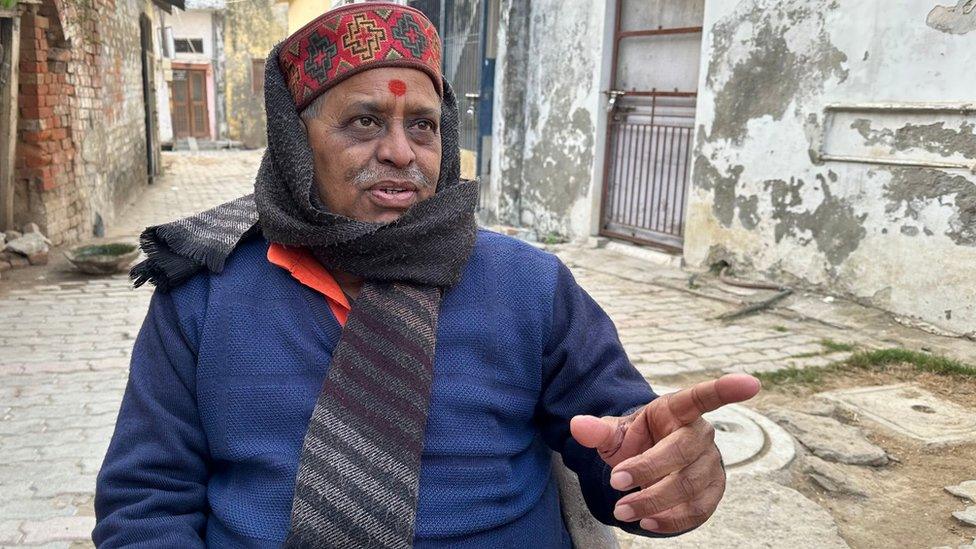
Santosh Dubey was part of the mob which pulled down the mosque in 1992
Muslims regularly offered prayers in the mosque until 1949, when idols of Lord Ram were placed in it, allegedly by Hindu priests. The gates of the mosque were then closed by a court order. In 1986, they were re-opened, many believe at the behest of the Congress party, then in power, in a rumoured attempt to woo the Hindu majority.
Then in 1990, the Hindu Nationalist Bharatiya Janata Party (BJP) - then just a small political party with little electoral success - spearheaded a mass campaign for a Hindu temple at the site. The campaign would later be seen as one of the key moments which transformed BJP into the virtually unbeatable political giant it is today, which now has Mr Modi at its head.
That year, tens of thousands of kar sevaks congregated in Ayodhya. When they started moving towards the disputed site, police fired at them, killing dozens. "Those bullets fuelled our anger," Santosh Dubey says. He was injured in the shooting.
Two years later, kar sevaks gathered in Ayodhya again.
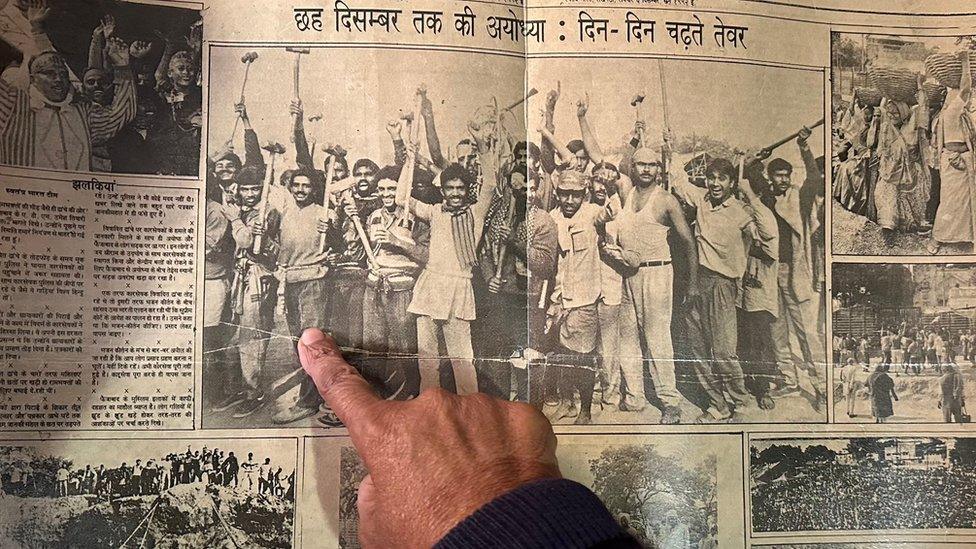
Pointing to his picture in an old newspaper, Santosh Dubey says he has no regrets
"The people who were guarding the disputed structure fled when they saw a huge crowd walking towards them with swords and hammers. We had practised everything earlier. We climbed on the domes and brought it down within a few hours."
Mr Dubey shows us a black and white photo that appeared in a newspaper of a group of men brandishing their weapons with raised arms, wide smiles on their faces. He says it was taken before the mosque was razed.
"We were happy, because we knew what was going to happen that day," he says, pointing to himself in the photo.
For Ayodhya's Muslims it was a day of terror.
"Hundreds of thousands of men were all over Ayodhya. They had sticks, swords and tridents. Our house was surrounded by them," says Anwari Begum, now 65.
"We ran from our homes. I ran with my six-month-old baby and small children. My husband was running behind us. When I turned, I saw that he had been caught by some men. We had to keep running for our lives."
The next day she found out her husband Mohammad Amin had been killed, one of at least 17 Muslims who died in shocking violence in Ayodhya that day.
"An eyewitness told us that he had been caught, his arms and legs were chopped off, he was dumped into a sack and taken away. We never found his body," she says breaking down.
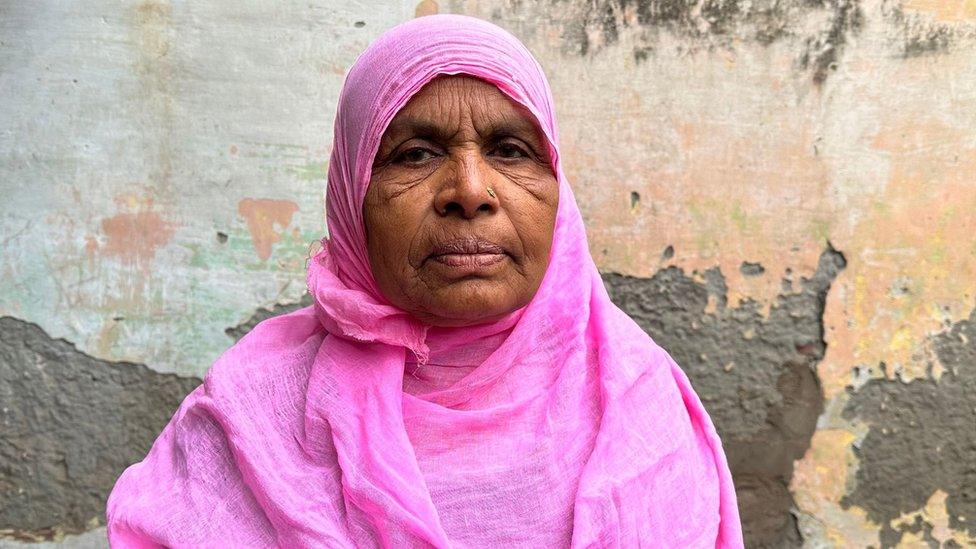
For Anwari Begum, the day was one of horror which ended in her husband's death
When she returned to her home, she found it had been burnt to the ground. It would take time, but over the years the family would manage to rebuild a small, two-room home on the same site.
"My husband used to take care of our family. I was left alone with six small children. We got some money from the government but it was not enough. My life was destroyed by that day," she says.
In the violence that swept across India after the mosque was torn down, nearly 2,000 people were killed. More than 900 died in the financial capital, Mumbai, alone, roughly two-thirds of them were Muslims. There were killings in other cities including Jaipur, Bhopal, Ahmedabad and Hyderabad.
In Ayodhya, Mohammad Shahid's father Mohammad Sabir was also killed brutally.
"They beat him and then they poured oil on both him and my uncle and set them on fire. We found their bodies," he says. "The country wants to forget what happened. But Muslims can never forget. It was a black day for us."
The family had a business supplying wooden carvings to temples in Ayodhya. The workshop was razed to the ground, and Mr Shahid was forced to become a rickshaw driver to earn a living.
Like Mr Shahid, Anwari Begum wants her son Sohrab, who's in his 30s, to leave for his safety around the inauguration.
"I'm not scared, but I am nervous," he told the BBC. "It's being said that 70,000 to 100,000 people are coming. The atmosphere could become charged, that's why Muslims are thinking of leaving. But I won't go. I don't think anything will happen."

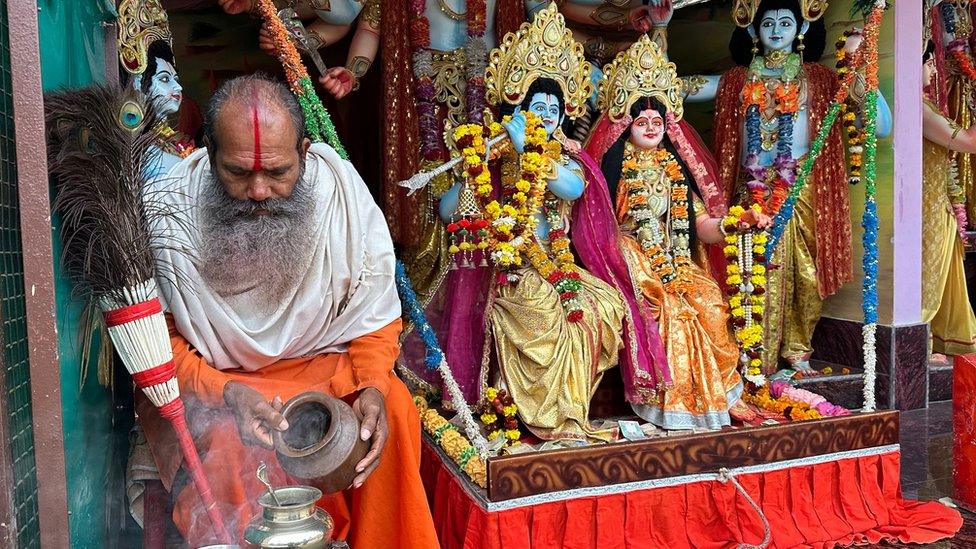
The opening of the temple is expected to draw people from across India
In Ayodhya, the temple site is abuzz with cranes and diggers sending dust into the air ahead of the inauguration. Thousands of workers in hard hats dot the area.
It's costing $217m (£170m) to build the temple, funded from private donations, the temple trust says. The makeover of the city is being done by the government, estimated to cost more than $3bn.
Amid the construction, hundreds and hundreds of proud worshippers stream in to get a glimpse of the idols, with rituals for their consecration in the new temple already under way.
Poonam Ohri, 40, had tears of joy rolling down her cheeks. "Our dream has come true because of Modi and the BJP government. I am overwhelmed."
Badri Narayan, an elderly farmer who had travelled hundreds of miles, said his happiness knew no bounds.
"When I visited before, Lord Ram's idol was in a makeshift tent. It was getting wet in the rain. Tears started falling from my eyes seeing that," he told the BBC. "And now he has been released because of Modi."
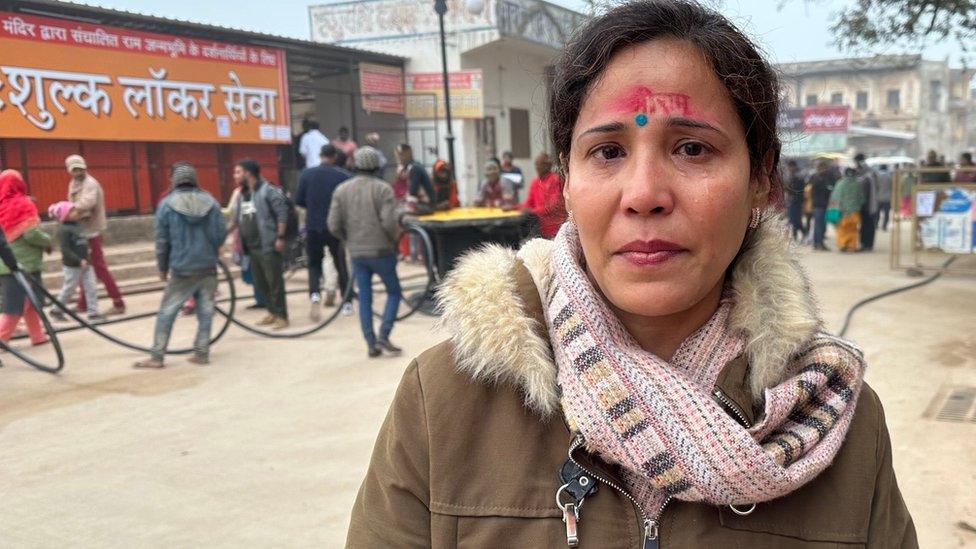
For many devotees, like Poonam Ohri, it is an emotional time
Prime Minister Modi has asked people not to come to Ayodhya on 22 January and to light a lamp in their homes. But he's also said everyone can visit from the next day.
And it is those days following the official ceremony which worry some in the Muslim community.
"If the government reached out to us and gave assurances that nothing will happen, that would prevent people from leaving, but so far they haven't done that," said Azam Qadri, a Muslim community leader.
Sohrab says "political leaders should have come to us and said what happened to you was wrong - they should have showed compassion, but they have not".
As for the new temple that's being opened, he says: "We feel happy they are building their temple, but we are also sad because it was built after destroying a mosque."
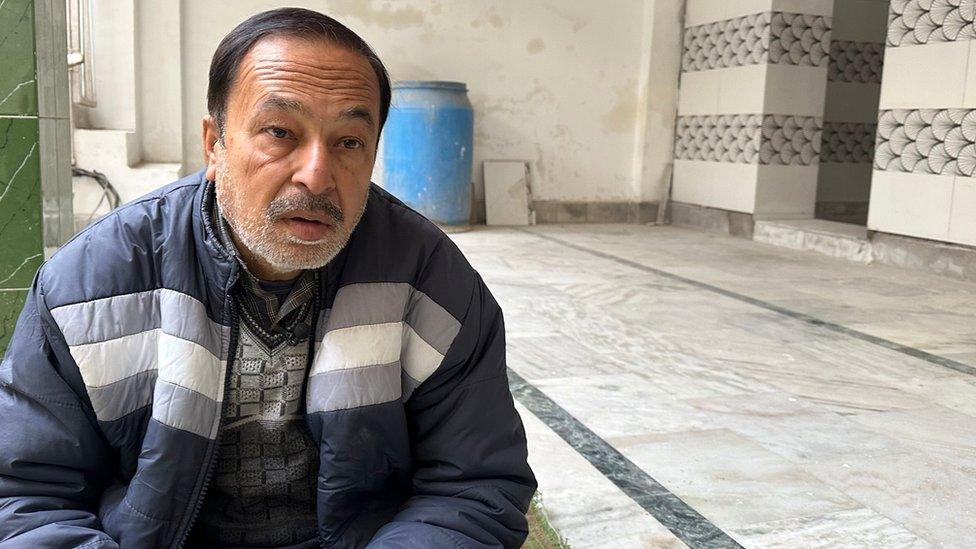
Mohammad Shahid says the city's Muslim community accepts the decision made by the Supreme Court
Mohammad Shahid says Hindus have the right to build the temple after the Supreme Court gave them the site. "We did not accept that decision happily, but what can we do," he says.
After years in the courts, the disputed site was handed over to Hindus by a Supreme Court judgment in 2019, despite the judges also finding that the mosque's demolition had been illegal. The ruling relied on archaeological evidence which showed that features of the foundations of the mosque "are suggestive of a Hindu religious origin".
It also said that evidence placed on the record proved that there was Hindu faith and belief that the site was the birthplace of Ram.
It was not proved that a temple had been destroyed to build the mosque.
The court also ordered a separate plot be given to Muslims to construct a mosque. It's 15 miles from Ayodhya, overgrown and empty.
It is simply too far away, says Mr Qadri: "If the government had given it as much attention by building roads and ring roads as it's doing for the temple, then work would have started there too."
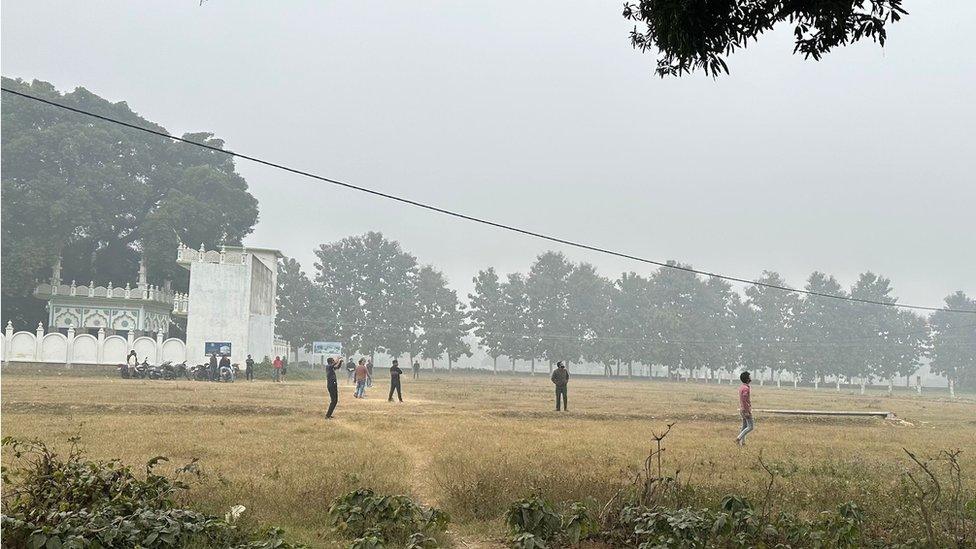
The land given to the Muslim community for a new mosque stands in stark contrast to the temple
Prime Minister Modi and the BJP are expected to sweep the general election later this year following the inauguration of the temple.
Many accuse him and his party of violating the constitution, of turning a religious event into a state-sponsored one.
But the BJP's local MP, Lallu Singh, saw no reason why Mr Modi shouldn't attend.
"If the prime minister is Hindu, why should he not visit the biggest centre of Hindu faith? What should stop him? Lord Ram is representative of the culture of this country," he told the BBC.
"The culture of the majority dominates the country, so it is 100% right that the PM do the opening. This does not mean we are discriminating on the basis of religion."
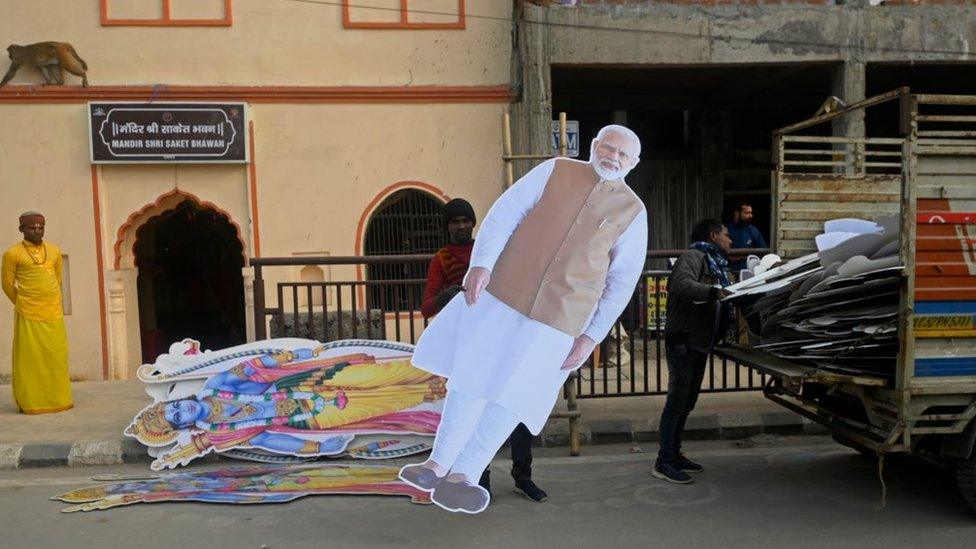
Questions have also been raised over the BJP's leader, Narendra Modi, attending the opening
There is also controversy around moving the idols into an unfinished temple, with some Hindu religious leaders accusing the government of prioritising electoral gains over the sanctity of Hindu rituals.
"I don't want to comment on what our religious leaders say. But the sanctum sanctorum where the idol will sit is complete. More worshippers will be able to come with ease now, that's why we are opening it," the MP says.
Back in 1992, the BJP's senior leaders expressed regret over the demolition of the mosque and said it should never have happened. How does Lallu Singh feel about it now?
"I believe what happened was right," he says.
Most Muslims and Hindus the BBC spoke to don't think longer-term there will be more hostilities in Ayodhya.
But some see Ayodhya as just the start - disputes and court cases are already ongoing over mosques in the cities of Mathura and Varanasi, referred to many by its ancient name Kashi.
"We had to wait for 450 years to get the birthplace of Lord Ram. I hope Kashi and Mathura will be ours soon too," says Aakash Jadhav, a 21-year-old Hindu devotee.
Related topics
- Published16 January 2024
- Published6 December 2017
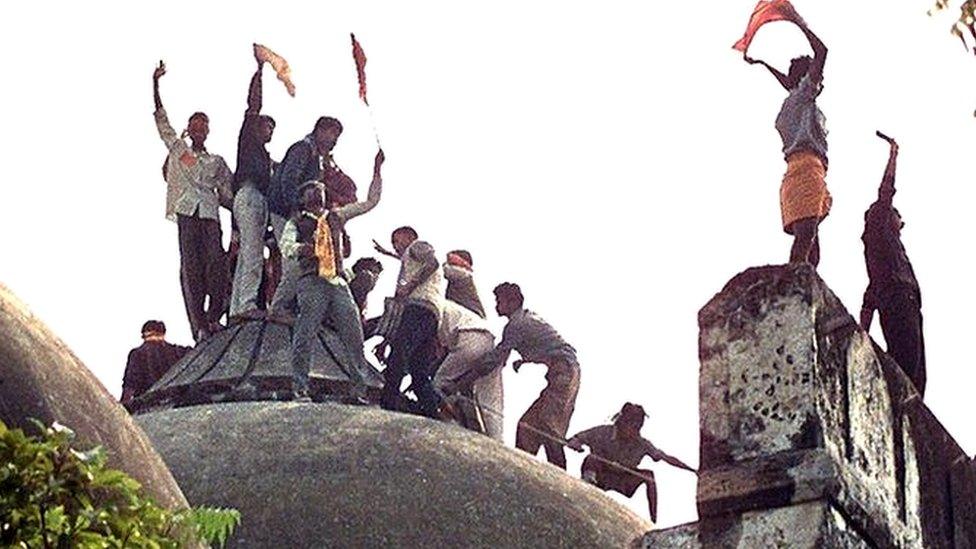
- Published5 December 2017
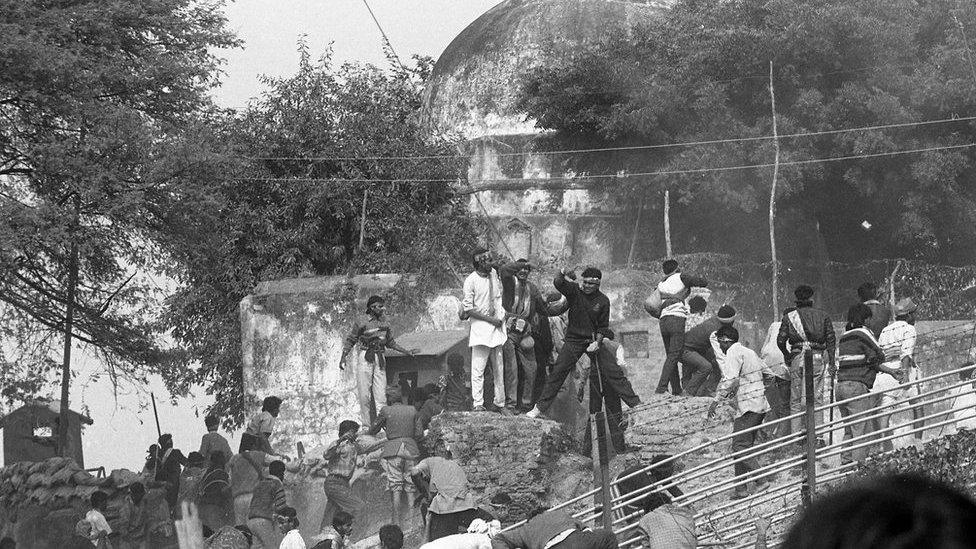
- Published9 November 2019
